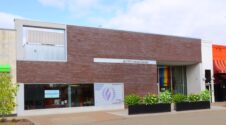by Sharon Gittleman
BOSTON- While there's no lack of studies examining gay and straight sexuality and health, issues related to bisexuals often go unexplored. The National Lesbian and Gay Task Force Policy Institute, BiNet USA and the Fenway Institute at Fenway Community Health recently combined forces to create a report offering an introduction to bisexuality and a guide to help prevent sexually transmitted diseases in that community.
The publication, "Bisexual Health: an Introduction and Model Practices for HIV/STI Prevention," is geared toward doctors, AIDS workers, journalists and activists. It reviews several questions including: What is bisexuality, why don't some people who have sex with both genders think of themselves as bisexual, what are the major health problems these individuals face, and how can researchers and other professionals help?
"The focus is on bisexual health issues," said study coauthor Marshall Miller. "We saw a real need for more education, both of the general public and health care providers, around bisexual issues."
Miller said some of the biggest problems bisexual people face are the assumptions made by physicians and other professionals.
"Some providers might presume someone who says they are bisexual has multiple partners," he said. "Many bisexuals are monogamous. A person who says they are bisexual is saying they are attracted to both men and women. Whether or not they act on it is another issue."
Acknowledging this factor is important for health care professionals, he said.
"If you hear someone has a same-sex partner and start talking to them as if they are gay, that would be invalidating," he said.
Adding small changes to typical HIV prevention programs can make them more relevant to bisexual people, said Miller.
"For instance, an HIV prevention program in the past that has focused on gay man can be inclusive of bi men by adding 'bi' to its name and by having content that's inclusive of people that identify as bi men," he said.
Miller said the report provides information about the program the Boston-based Fenway Community Health created, which focused on bisexual health problems.
"It included a support group for bisexual and bi-curious men and an educational program in bars and clubs," he said. "We would teach about safer sex, STD and STI prevention. Part of what we taught was how to make teaching about sex fun."
Study coauthor Julie Ebin serves as prevention and education program manager for the Fenway Institution at Fenway Community Health.
"The mission of our health center is to serve the LGBT community and those who live and work in the neighborhood," she said.
Health care providers should be trained to take a complete sexual inventory to get relevant information, said Ebin.
There are a number of things physicians and other health providers can do to reach out to bisexual people.
"For example, having brochures in your waiting area that specifically say the word, 'bisexual,'" she said. "Talking about safer sex in terms of the anatomy of the partner not gender. Finding out what their behaviors are – not making an assumption based on their identity."
You can download the study at http://www.thetaskforce.org on the Internet.










